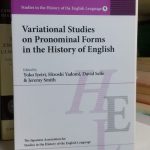Publications
“Describing the process of lexical borrowing: intend and other related words in late Middle English”
This paper proposes that more light should be thrown to the “process” of lexical borrowing and discusses, as an illustrative case, the use of four INTEND words, namely INTENT, INTEND, INTENTION, and INTENDMENT, in William Caxton’s writings.
